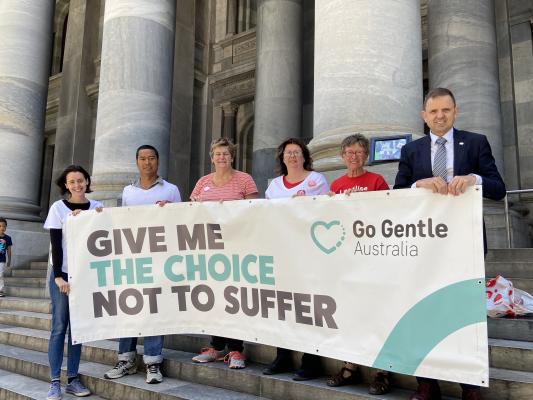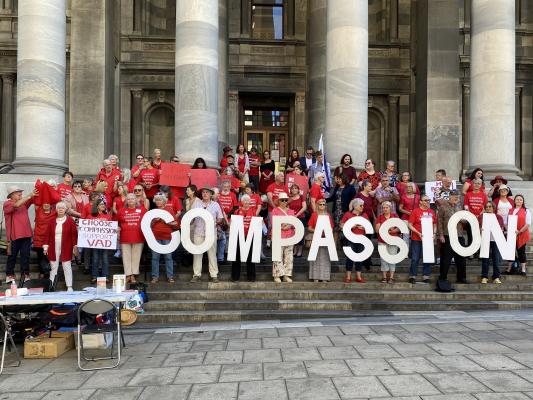
By Raquel Mustillo
LIMESTONE Coast residents are overwhelmingly supportive of voluntary assisted dying laws, with two-thirds of MacKillop and Mount Gambier voters believing terminally ill patients should be able to end their own lives with medical assistance.
Data released by Voluntary Assisted Dying South Australia sourced from the 2019 ABC Vote Compass found more than 80pc of the 464 MacKillop respondents supported voluntary assisted dying.
Voters who strongly agreed (58pc) outnumbers those who strongly disagreed (8pc) by 12.9 times.
Of the 597 respondents from the Mount Gambier electorate, 77pc supported voluntary assisted dying, with 56pc strongly agreeing with euthanasia and just 6pc strongly disagreeing.
Member for MacKillop Nick McBride said he was pleasantly surprised with the strong support for voluntary euthanasia by respondents, adding the results provided him with confidence.
“Not knowing who the cohort was who have responded, to me it could be the fact that we are an older generation in MacKillop and perhaps that older generation wants to look at and consider end of life dying choices,” he said.
“It may not be that everyone needs to use this type of process, but people like to know and have the comfort that when their life and qualified has evaporated and there is no future in front of them, they want to have a strong system.
“I am pro-choice and allowing people to make their own choices while also looking for strong safeguards so voluntary assisted dying isn’t able to be misused by abused.”
The bill is based on the Victorian model, which provides people with advanced diseases expected to cause death within six months or 12 months for neurodegenerative diseases access to voluntary assisted dying.
The nine step process requires individuals to ask their doctor for information about voluntary assisted dying before being assessed by two doctors who have completed training in assessing people for voluntary dying to see if requirements are met.
Under the proposed law, a 10-day wait period will be implemented between a request and the issuing of a permit.
Member for Mount Gambier Troy Bell said the Victorian model has been in effect for almost two years and is considered one of the safest models in the world.
Mr Bell said the results were reinforcing the support for the legislation in the community, saying the majority of people who had approached him and contacted his office backed the bill. “I want to strike the right balance between compassionate end-of-life care and protecting the most vulnerable people in my community and I am satisfied these safeguards are in place with this bill,” he said. “I have wrestled with the issues surrounding this debate for a number of years but a defining moment for me was watching my uncle slowly die from cancer.
“That experience cemented my position and my belief that for those who have a terminal illness and are approaching the end of their life should have the right to choose how and when that occurs.”
Voluntary Assisted Dying South Australia spokesperson Lainie Anderson says the overwhelming community support was heartening and urged people to contact their state representatives to reinforce their views.
“Our state MPs are now debating the 17th bill on this issue to come before parliament in 26 years – we want this bill to succeed so the people of South Australia finally get access to choice and compassion at end of life,” Ms Anderson said.
“The current bill, with 68 safeguards, is mirrored on the Victorian law which has now been in place for more than 18 months, providing reassurance, dignity and control for those with a terminal illness.”
Debate on the Voluntary Assisted Dying bill resumes in the state’s Upper House this week.
While Mr Bell and Mr McBride – who sit in the state’s lower house – are supportive of the bill, Labor parliamentarian Clare Scriven is opposed to the proposed changes.
The law has also now passed in Western Australia and Tasmania.
Voluntary assisted dying advocate and A Peaceful End convener Angie Miller says it would be wonderful for terminally ill South Australians to have the same choice at end of life as Australians in an increasing number of states.
“In the absence of legislation, some people with a terminal illness feel they have no option but to take their own lives, and that is absolutely heartbreaking,” Ms Miller said.
“SA Police has for the first time backed voluntary assisted dying legislation under strict circumstances and that’s a significant step forward.”
South Australians who support voluntary assisted dying are urged to email or phone their Member of Parliament or are seeking information about the proposed bill are encouraged to visit vadsa.org.au for further information.
HAVE YOUR SAY – editorial@tbwtoday.com.au








